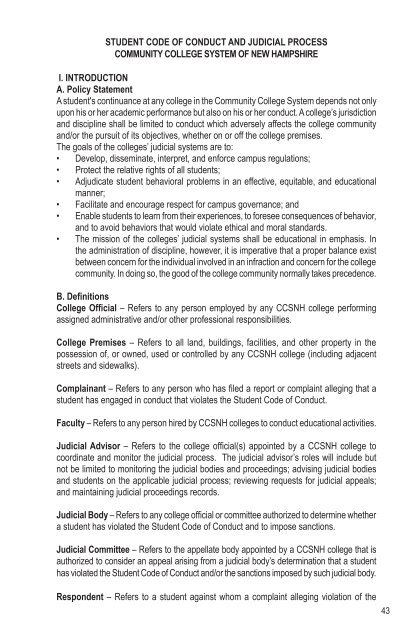StudentHandbook2018.2019
Create successful ePaper yourself
Turn your PDF publications into a flip-book with our unique Google optimized e-Paper software.
STUDENT CODE OF CONDUCT AND JUDICIAL PROCESS<br />
COMMUNITY COLLEGE SYSTEM OF NEW HAMPSHIRE<br />
I. INTRODUCTION<br />
A. Policy Statement<br />
A student's continuance at any college in the Community College System depends not only<br />
upon his or her academic performance but also on his or her conduct. A college’s jurisdiction<br />
and discipline shall be limited to conduct which adversely affects the college community<br />
and/or the pursuit of its objectives, whether on or off the college premises.<br />
The goals of the colleges’ judicial systems are to:<br />
• Develop, disseminate, interpret, and enforce campus regulations;<br />
• Protect the relative rights of all students;<br />
• Adjudicate student behavioral problems in an effective, equitable, and educational<br />
manner;<br />
• Facilitate and encourage respect for campus governance; and<br />
• Enable students to learn from their experiences, to foresee consequences of behavior,<br />
and to avoid behaviors that would violate ethical and moral standards.<br />
• The mission of the colleges’ judicial systems shall be educational in emphasis. In<br />
the administration of discipline, however, it is imperative that a proper balance exist<br />
between concern for the individual involved in an infraction and concern for the college<br />
community. In doing so, the good of the college community normally takes precedence.<br />
B. Definitions<br />
College Official – Refers to any person employed by any CCSNH college performing<br />
assigned administrative and/or other professional responsibilities.<br />
College Premises – Refers to all land, buildings, facilities, and other property in the<br />
possession of, or owned, used or controlled by any CCSNH college (including adjacent<br />
streets and sidewalks).<br />
Complainant – Refers to any person who has filed a report or complaint alleging that a<br />
student has engaged in conduct that violates the Student Code of Conduct.<br />
Faculty – Refers to any person hired by CCSNH colleges to conduct educational activities.<br />
Judicial Advisor – Refers to the college official(s) appointed by a CCSNH college to<br />
coordinate and monitor the judicial process. The judicial advisor’s roles will include but<br />
not be limited to monitoring the judicial bodies and proceedings; advising judicial bodies<br />
and students on the applicable judicial process; reviewing requests for judicial appeals;<br />
and maintaining judicial proceedings records.<br />
Judicial Body – Refers to any college official or committee authorized to determine whether<br />
a student has violated the Student Code of Conduct and to impose sanctions.<br />
Judicial Committee – Refers to the appellate body appointed by a CCSNH college that is<br />
authorized to consider an appeal arising from a judicial body’s determination that a student<br />
has violated the Student Code of Conduct and/or the sanctions imposed by such judicial body.<br />
Respondent – Refers to a student against whom a complaint alleging violation of the<br />
43





